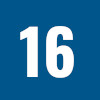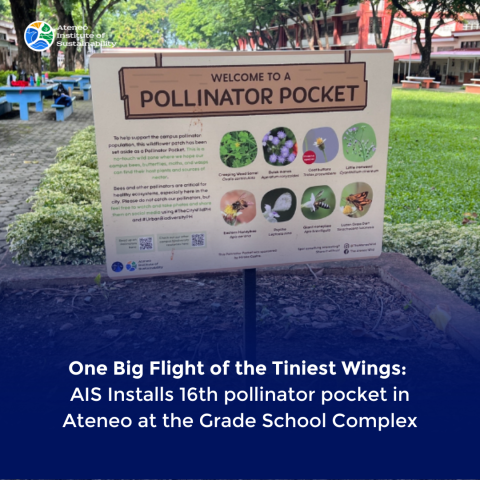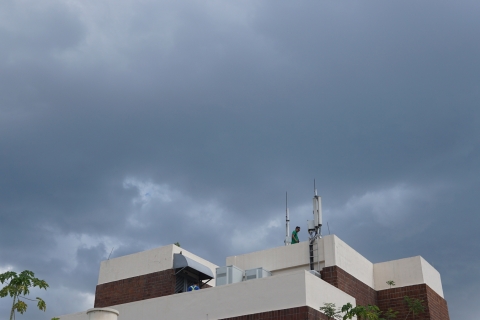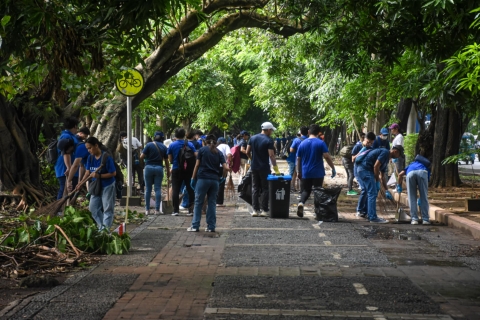Power of stories and activism: MCR-Ateneo commences 2024 Climate Voices webinar series
24 Jun 2024 | Jan Raphael M Pangilinan and Ivy Geraldine Ferrer
On 03 April 2024, the My Climate Risk – Ateneo de Manila University (MCR-Ateneo) Regional Hub, which is hosted by the Ateneo Institute of Sustainability, organized a webinar titled “The Power of Stories and Activism in the Pursuit of Climate Justice.” My Climate Risk is a lighthouse activity of the World Climate Research Programme which aims to develop and mainstream a bottom-up approach to regional climate risk, and has a mycorrhizal network of hubs that span all continents except Antarctica.
The webinar, co-hosted by DAKILA and Active Vista, featured Mr Joshua Villalobos, who identifies as a young queer environment and climate justice activist. Mr Villalobos leads the Climate and Environment Campaign at DAKILA and a local movement called Negrosanon Initiative for Climate and Environment (NICE). He shared valuable insights on the importance of understanding local contexts, creating compelling narratives, and reflections on the role of activism. Additionally, he discussed DAKILA’s initiatives, such as their use of films and documentaries and their support for young filmmakers. The topic of corporate accountability was also addressed.
Dr Regina R Rodrigues, Professor of Physical Oceanography at the Federal University of Santa Catarina, Brazil and one of the Co-Chairs of the Scientific Steering Group at My Climate Risk, delivered the opening remarks on behalf of herself and her co-chair Dr Theodore G Shepherd, enlightening the participants about My Climate Risk’s vision and mission. The webinar concluded with a message by Dr Emma Porio, Professor Emeritus at the Department of Sociology and Anthropology of Ateneo de Manila University and a Collaborator of the Hub, where she delved into the principles of climate justice and the importance of creative activism, actionable climate information, and transdisciplinary action research. The session was moderated by Mr Daniel C Ratilla, the Program Officer for Climate and Disaster Resilience at the Ateneo Institute of Sustainability.
Mr Villalobos started by introducing DAKILA, an organization dedicated to embedding social consciousness within communities and society, showcasing an active approach to climate activism. He highlighted the significant lag in achieving climate goals despite over 30 years of annual negotiations. The Global North, which includes the US, EU-28, China, and Russia, contributes the most in global carbon emissions. However, countries that contribute less are more vulnerable from climate-induced disasters. For example, the Philippines only contributes 0.33% to global emissions, but consistently ranks among the top nations at risk, according to the World Risk Report. While this serves as a basis for the concept of “common but differentiated responsibilities (CBDR),” this disparity underscores the injustices faced by countries like the Philippines due to the climate crisis. Later on, he added that calling for accountability and proper leadership are among the steps that will help in achieving climate justice. The larger economies who have contributed more to carbon emissions should be “leading the way [and] doing their fair share,” he concluded.
Corporate accountability, according to Mr Villalobos, is crucial for tackling climate change, especially for those in the fossil fuel industry. He underscored the importance of urging these corporations to contribute to climate finance to mitigate the damage their businesses and business models have caused. Activism is thus vital in driving more ambitious and effective climate policies and climate action; he did clarify, however, that while activism played is not the sole reason in delivering outcomes such as demands to phase-out fossil fuels, the Paris Agreement, and the establishment of the Loss and Damage Fund, it played a crucial part in delivering these.
Speaking on the power of storytelling, Mr Villalobos noted that it is a powerful tool in climate activism, transforming facts into emotionally engaging narratives that raise awareness and spur action toward climate justice. He also introduced some of DAKILA’s initiatives, such as free film screenings and training filmmakers through Climate Story Labs to raise consciousness and inspire action, with an emphasis on the importance of making climate facts compelling to different audiences. Supporting young filmmakers in particular is a crucial aspect of DAKILA’s mission. The use of films and documentaries to highlight environmental issues exemplifies the power of visual storytelling in understanding local contexts and the needs of decision-makers, as this is fundamental in climate advocacy. Mr Villalobos used Al Gore’s “An Inconvenient Truth” as an example, showing how the documentary significantly increased climate change awareness and action, contributing to a surge in the solar power industry, the signing of the Paris Agreement, and a global discourse on climate action.
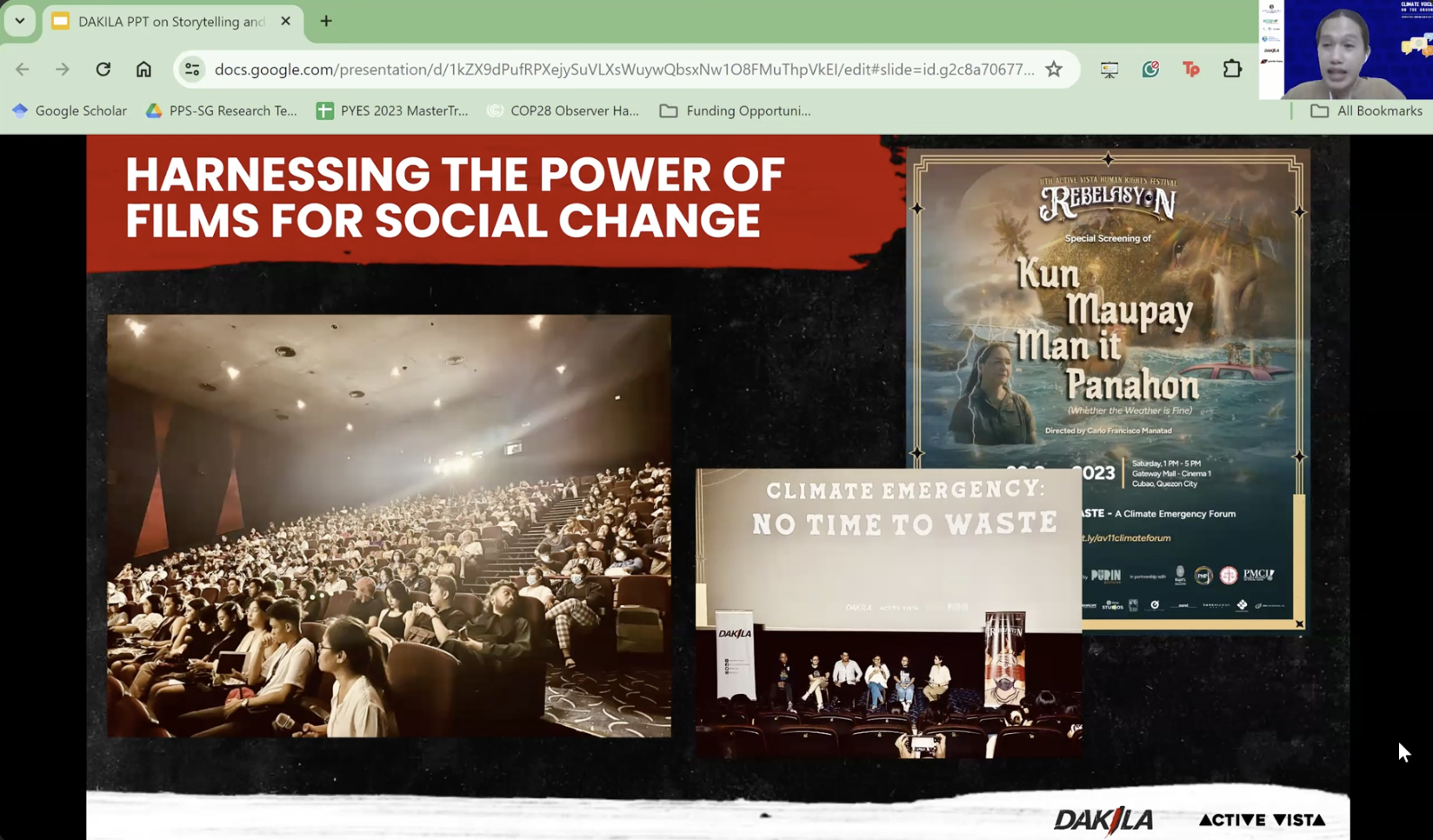
“You don’t need to be a filmmaker to tell your story,” he noted. “All of us have a climate story. Beyond the helpful statistics, we need to humanize these facts. People need to feel, hear, and understand that these are real issues, not just numbers.”
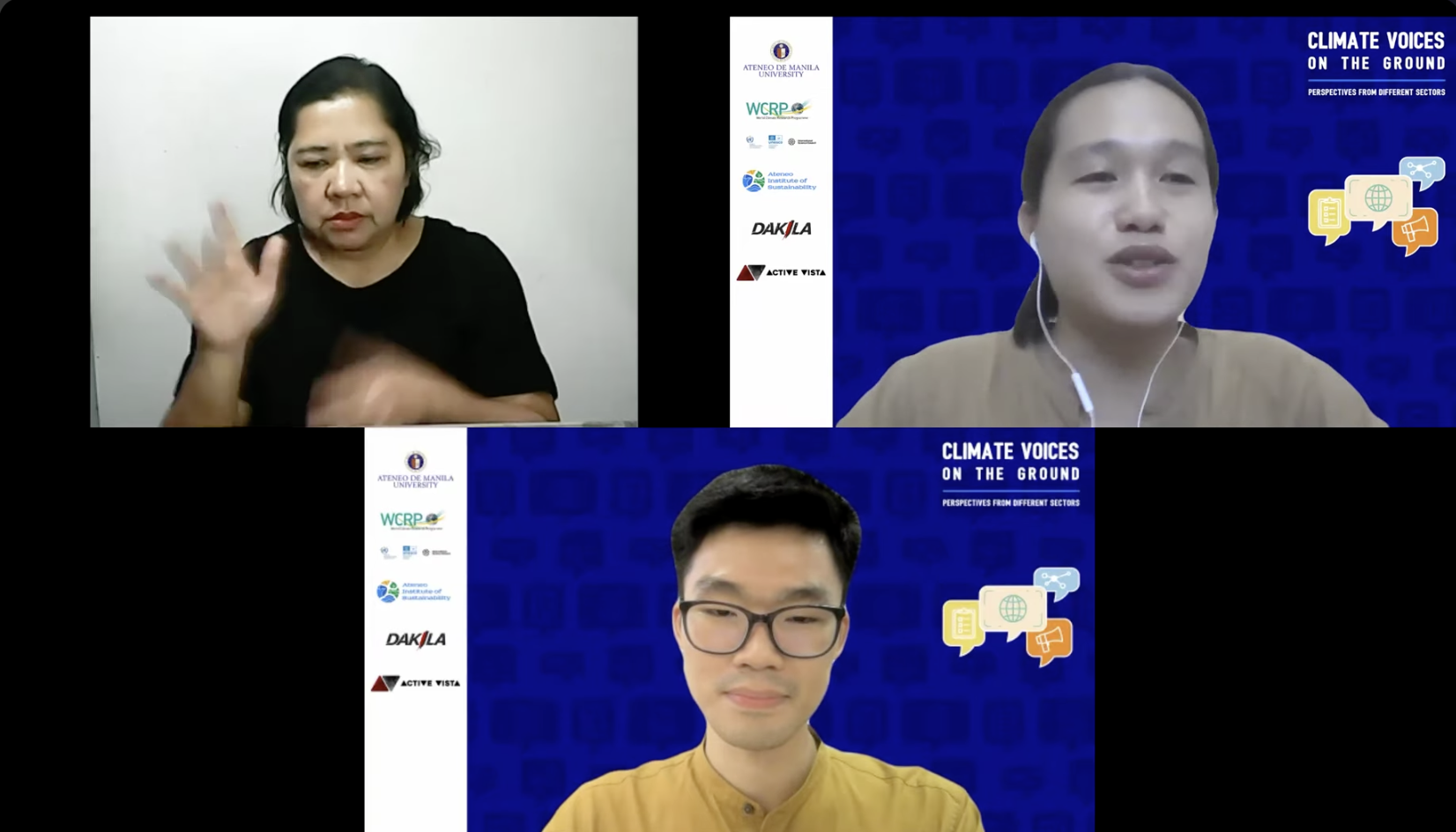
During the Open Forum, Mr Villalobos fielded questions on the fossil fuel industry and energy. In particular, he called out the fossil fuel industry, noting that these companies created a false narrative in an effort to shift the blame of pollution to consumers due to persistent purchasing patterns. However, he indicated that there is an inherent need to change destructive business models, particularly as most fossil fuel companies knew of the effects of their products on climate change as early as the 1970s. Mr Villalobos also mentioned the concept of “cultural lock-in,” leaving consumers with no other choice but to purchase these products.
To close, Mr Villalobos reflected on the reality that climate stories can bore people and would not pique their interest, even though there is an abundance of information online. “For advocates, it has been a challenge of how to communicate and to ensure that their messages are getting across,” he added. For DAKILA, they always try to innovate their methods, including the use of street-level language and humor. He explains how “storytelling,” in the context of activism, is presenting facts in a creative and “storified” way.
To learn more about DAKILA and Active Vista, readers may click on the links provided, or search the organizations on Facebook and Instagram.
The session was attended by participants from the Philippines, with international attendees from Japan and Pakistan. This webinar is the first installment of the 2024 iteration of “Climate Voices on the Ground: Perspectives from Different Sectors,” a webinar series by the MCR-Ateneo Hub. The series occurred on Wednesdays of April 2024. Replays and highlights of the webinar series are available in the following page.


